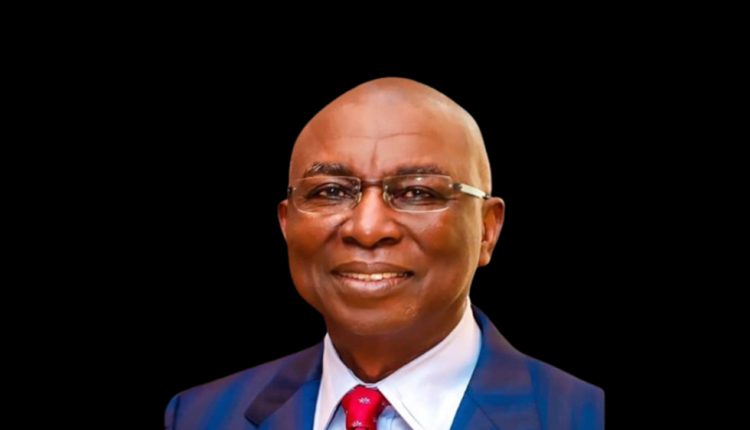BREAKING: MEMS And The Maritime Transformation Story

Amid the unfounded criticisms of the Maritime Enhanced Monitoring System (MEMS) initiated by the Dayo Mobereola leadership at the Nigerian Maritime Administration and Safety Agency (NIMASA), a project informed analysts say will bring more funds into the coffers of the agency, Nigeria’s maritime sector is sailing into a new era – one defined by security, reform, and international respect.
For the record, MEMS is an ambitious, integrated digital platform designed to consolidate NIMASA’s data, automate enforcement, streamline billing, and provide real-time vessel monitoring.
Developed through a proposed public-private partnership with Royal Diadem Consults Ltd, the MEMS is set to cost N7.54 billion with 75% financed through debt and 25% equity.
In exchange, Royal Diadem is expected to receive 13.5% of NIMASA’s revenue over a 15-year period, pending the Federal Executive Council (FEC) approval.
This revenue-sharing model has triggered internal concerns, with some members of staff calling it excessive for what they describe as “a glorified ERP system.”
Critics have questioned the project’s cost-benefit balance, citing NIMASA’s annual revenues, estimated at N497 billion in recent years, and projecting that Royal Diadem could earn several times its initial investment within a few years.
Others lament what they perceive as a lack of transparency in the proposal’s review process, stating that there was no cross-departmental vetting before the agreement was submitted to FEC.
Meanwhile, NIMASA, in a response, defended the MEMS initiative, dismissing the claims of secrecy or financial impropriety.
“The MEMS platform introduces digital traceability at the core of our maritime operations,” the agency said.
“With real-time visibility into vessel movements, smart invoicing, incident management, and environmental compliance, the system will not only eliminate leakages but enhance revenue capture across the board.”
NIMASA further emphasised that each waste offload, compliance violation, or inspection log would now be traceable and billable, converting what was previously lost revenue into consistent income for the government.
Additionally, MEMS is projected to boost revenue by 30% within three years; increase regulatory compliance to 95%; reduce maritime pollution by 20%; and create up to 1,000 jobs.
While some members of staff remain sceptical, independent analysts argue that such outcomes justify a performance-based partnership.
Unlike fixed contracts where vendors are paid regardless of outcomes, this model ties Royal Diadem’s earnings directly to NIMASA’s success.
Globally, maritime agencies are racing to implement digital systems.
Nigeria, as Africa’s fourth-largest economy and a key regional shipping hub, cannot afford to fall behind.
By investing in MEMS, NIMASA is positioning itself for long-term relevance in global maritime trade.
Safe Waters
Once plagued by piracy, Nigerian waters are now among the safest in the region.
Through sustained efforts and strategic collaboration, maritime piracy has been reduced to zero, a milestone that a few nations in the Gulf of Guinea can claim. This newfound security is not by chance – it is the result of a deliberate and comprehensive strategy, including the full-scale implementation of the Deep Blue Project, a multi-agency initiative designed to secure Nigeria’s territorial waters and Exclusive Economic Zone.
The project has delivered state-of-the-art surveillance, rapid-response assets, and a trained force capable of addressing threats at sea and along the coast.
This transformation has not gone unnoticed.
The United States Coast Guard recently ranked Nigeria among the best globally in compliance with the International Ship and Port Facility Security (ISPS) Code. With this recognition, Nigeria has entered a three-year structured engagement with the U.S. to lift the long-standing “Conditions of Entry” imposed on vessels arriving from Nigerian ports – an important marker of international trust and safety.
But security alone isn’t the full story.
NIMASA has also launched a bold campaign for the removal of the War Risk Insurance Premium – an extra cost previously levied on vessels due to security concerns.
If successful, this will significantly reduce the cost of doing business and reposition Nigeria as a preferred maritime hub in West Africa.
On the legislative front, the management has worked closely with the Federal Ministry of Justice to domesticate 55 international maritime regulatory instruments, ensuring Nigeria remains compliant with evolving global standards.
In a landmark achievement, Mr. President recently signed six International Maritime Organisation (IMO) instruments of accession, five of which have already been deposited with the IMO by the Honourable Minister – a step that signals Nigeria’s commitment to international best practices.
After over two decades of delay, the long-awaited disbursement of the Cabotage Vessel Financing Fund (CVFF) is finally within reach.
This milestone will boost indigenous shipping capacity, empowering local operators and reducing dependence on foreign vessels in coastal trade.
Internally, the agency has undertaken a sweeping re-engineering effort to enhance governance, improve staff welfare, and institutionalise a culture of motivation and excellence.
These reforms are designed to ensure that the maritime administration is not just effective today but resilient and responsive well into the future.
Reform, Vision
Lastly, the nation has seen marked improvement in port and flag state inspections, reflecting a commitment to safety, compliance, and service delivery.
What is unfolding is not just a reform agenda – it is a story of vision, resolve, and national renewal.
Nigeria is no longer navigating with outdated maps; it is drawing new ones – bold, strategic, and forward-looking.
– Charles sent this piece from Calabar, Cross River State
